
SUSTAINABLE
DEVELOPMENT
REPORT 2015

IMPERIAL
SUSTAINABLE
DEVELOPMENT
REPORT 2015
|
OUR BUSINESS PROFILE|
LEADERSHIP MESSAGES|
PEOPLE|
SOCIAL IMPACT|
ENVIRONMENTAL PERFORMANCE|
ROAD SAFETY|
DOWNLOADS|
GRI INDEX

SUSTAINABLE
DEVELOPMENT
REPORT 2015

ABOUT THIS
REPORT
REPORT
PURPOSE
Since it was first produced in 2011, our sustainability report has brought together information and data on sustainability from across the group
Read more

REPORT
FORMAT
We are producing a full online report for the first time in 2015, in addition to a printed summary report
Read more

SCOPE AND
BOUNDARY
This report covers businesses globally which are part of the Imperial Group and over which Imperial has operational control
Read more

COMPLIANCE
We have applied the G4 guidelines of the Global Reporting Initiative (GRI) for the first time in 2015
Read more

BALANCE AND TRANSPARENCY
We understand that our reputation as a business will be enhanced by a balanced approach to reporting on our performance and we have strived to be objective and transparent in compiling this report.
Read more

REPORT
PURPOSE

Imperial has produced a sustainable development report since 2011, to bring together information from
across the group on the sustainability themes that we believe are important to the business and to
stakeholders, and to document our approach to sustainable development.
We are currently working to form a clearer picture of the issues that are critical to our stakeholders and
anticipate that in the future this analysis will support improved reporting and communication to all
stakeholders.
As in previous years, one of the most important audiences for our sustainable development reporting
remains our employees, as we develop the knowledge and understanding required to address
sustainable challenges more consistently across the business.
REPORT
FORMAT

This sustainable development report is intended to complement our Integrated Annual Report by
expanding on our approach to sustainable development and presenting this information in a way which
can be accessed and used by a broad stakeholder audience.
We have therefore adapted the format of our sustainable development report from previous years:
>
Our full report is contained on this website, where
we have published comprehensive data relating to the
sustainable development strategy and performance of
the business
>
A concise summary report gives an overview of our
sustainable development priorities and performance
and can be downloaded and printed from this website
Printed copies of this document are available on
from sustainabledevelopment@ih.co.za
SCOPE AND
BOUNDARY

The report is intended to be read by both South African and international stakeholders. It covers the
businesses over which Imperial has operational control, including those in Africa, Europe, the United
Kingdom, the United States and Australia.
Leased facilities are treated as group-owned for reporting purposes. Data in this report excludes
businesses that have been sold or discontinued, and businesses that are held for sale. Entities that are
not operationally controlled, including assets that are owned but not operated by the group, are not
included in the scope of this document.
Although our operations have undergone expansion and reorganisation during the year, the size,
structure, ownership and products and services offered are not materially different to those covered in
our 2014 report, published on 30 September 2014.
COMPLIANCE WITH EXTERNAL REPORTING GUIDELINES

This report has been prepared in accordance with the G4 guidelines of the Global Reporting Initiative on a core basis. This is the first year in which we have applied the G4 guidelines. Whilst we have made significant progress in our reporting to ensure compliance with the G4 guidelines, we will continue to refine procedures for reporting sustainability data further in future years, including through third-party assurance of non-financial data. As we report across a wide range of indicators, we seek to ensure that our reporting systems capture information on a consistent basis from all business divisions.
BALANCE AND
TRANS-
PARENCY

We understand that our reputation as a business will be enhanced by a balanced approach to reporting on our performance and we have strived to be objective and transparent in compiling this report.
REPORT ASSURANCE
For the first time during this financial year, we engaged an
independent third party to conduct a readiness audit on the
most significant non-financial metrics we publish.
The limited assurance has been obtained from Deloitte and Touche for 2015 and is
available here
Indicators included in the scope of the 2015 readiness audit are:

Direct energy consumption
and Scope 1 emissions,
specifically from diesel,
petrol and heavy fuel oil,
which are the most significant forms of fuel usage for the group

Accidents
and injuries
per million kilometres travelled
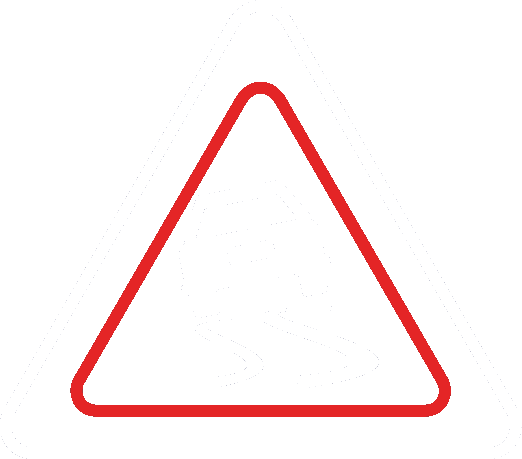
Road fatalities

Indirect energy consumption
and Scope 2 emissions, specifically electricity purchased from the grid

Total training hours and monetary value spent on training
FOUNDED IN 1948 AS A CAR DEALERSHIP
IN JOHANNESBURG,
SOUTH AFRICA, IMPERIAL
HAS APPLIED ITS CAPABILITIES TO GROW INTO
NEW PRODUCTS, BUSINESSES AND MARKETS.
Driving the parenting advantage
Read more

DRIVING THE
PARENTING
ADVANTAGE

Today, our 53 000 people serve clients from more than 1 200 locations in 31 countries on five continents,
extending the leading positions of our five divisions in carefully chosen segments and specific niches of
the logistics and vehicles value chains. For over six decades, through economic cycles, political transition
and social transformation, the underlying theme of Imperial's development has been leadership in mobility.
In an environment of profound structural and systemic change, defending and extending the group's leadership
requires new vision and understanding, discipline and agility.
The changes underway at Imperial are therefore transformational. They begin with greater strategic clarity at
corporate and business level. They call for sharper execution that increases returns on capital and executive
effort. They compel us to deliver social value while enhancing our core business operations. They target
productivity and efficiency improvements through a simplified group structure. And, by deepening a culture
of empowered accountability, they will drive focused long-term value creation for all our stakeholders.
While retaining the entrepreneurial creativity and capital management excellence that underpinned our success in
the past, we are implementing the strategy, structures and mind-set that will shape our success in the future.



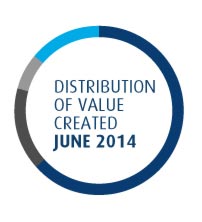
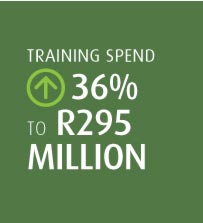



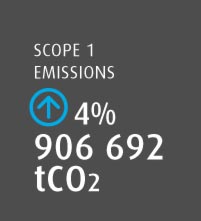
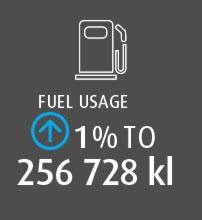
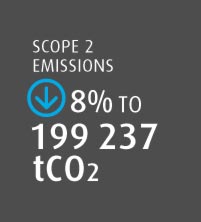

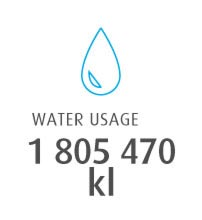

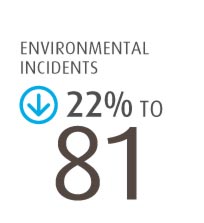

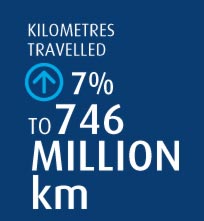
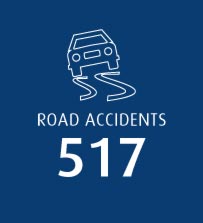
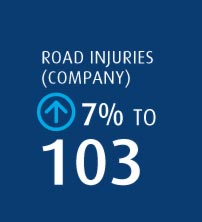

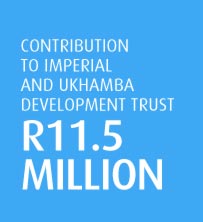




OUR STRATEGY
Imperial's strategy seeks to drive capability-based growth and focused value creation through greater strategic clarity and financial discipline at group and divisional level.


The major initiatives that will drive our strategic progress are encapsulated
in eight strategic thrusts, which provide a precisely worded set of objectives
and guidelines against which management
can act and report to the board.
OUR SUPPLY CHAIN
The supply chains for these business lines are
complex, drawing on a large network of business
relationships. Our role in the supply chain varies
according to the business line and the sector
or client served.
During 2015, the Imperial group spent R86 billion on
the procurement of goods and services from suppliers.
In the logistics supply chain, our role is typically to
transport goods from one part of a clients' business to
another, or between our clients and their suppliers or
clients. We provide an end-to-end service offering,
with tangible value-add through a fully-integrated
supply chain. In our European operations, we provide
contract manufacturing and related value-added
services to the chemical industry.
DOWNLOAD

LOGISTICS AFRICA
Logistics Africa provides outsourced supply chain management, servicing
the Southern, West and East African markets through three regional hubs.
The division maintains its leading position in the South African logistics and
supply chain industry through reliable and high-quality service delivery,
commitment to its clients' business and innovation to drive improvement.
Across sub-Saharan Africa, the division provides a comprehensive and
integrated demand-driven route to market as a distributor of consumer
and pharmaceutical goods.
MATERIAL SUSTAINABILITY ISSUES
FUEL AND EMISSIONS EFFICIENCY
The division is a major user of fuel and the largest contributor to the group's Scope 1 emissions
Read more

MINIMISING OUR ENVIRONMENTAL IMPACT
The drive to minimise environmental impact and ensure regulatory and legal compliance is a significant area of focus for the division
Read more

ROAD SAFETY
During 2015, the division delivered R50 billion in retail goods across the continent, covering almost 500 million kilometres
Read more

PEOPLE, PERFORMANCE AND SUCCESSION
Employees play a key role in ensuring that the division reaches its strategic and growth objectives
Read more

SOCIAL IMPACT
Our core logistics business in Africa has a significant social and development impact
Read more


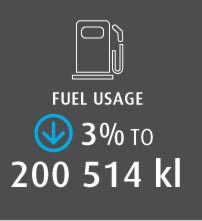

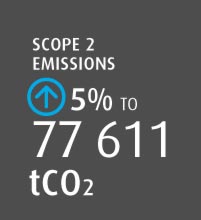
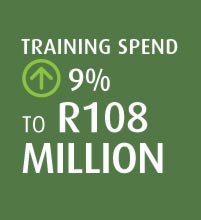



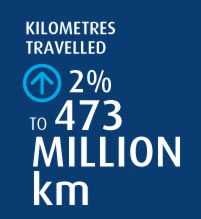
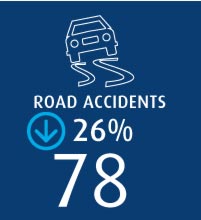






FUEL AND EMISSIONS EFFICIENCY

The division is a major user of fuel and the largest contributor to the group's scope 1 emissions. It accounts for 78% of the group's fuel consumption and 60%
of scope 1 emissions.
Initiatives in the division to improve fuel and emissions efficiency focus on three components that influence fuel consumption vehicle utilisation, vehicle
specification and driver ability. Improvements in fuel efficiency have a significant positive cost impact as fuel is one of the major drivers of logistics costs.
All vehicles purchased by the division are tested for their suitability and fuel consumption. The division's policy is to purchase the highest Euro-rated
vehicles available, with constant pressure being applied to OEMs to supply higher-rated trucks that produce lower emissions and use less fuel. There is an
ongoing focus on working with drivers to produce optimum fuel efficiencies from vehicles. Driver training programmes are undertaken on a regular basis to
support drivers in optimising vehicle technology.
Despite revenue growth of 15% during 2015, and an increase in the distance travelled by the division's vehicles of 2%, fuel usage fell by 3% and scope 1
emissions by 6%, demonstrating that measures to improve fuel and emissions efficiency are having a positive impact.
MINIMISING OUR ENVIRONMENTAL IMPACT

The drive to minimise environmental impact and ensure regulatory and legal compliance is a significant area of focus for the division. During the year, the
division introduced an environmental policy, supported by a policy statement which sets out the division's commitments in respect of the environment.
Where environmental legislation is in force in the countries where the division operates, the division's primary objective is to ensure compliance with all
legislation. In the absence of relevant local legislation, industry best practice is applied. Waste management and the risk of contamination of water or soil
as a result of discharges are some of the potential environmental impacts managed by the division. The number of environmental incidents reduced sharply
by 23% during 2015, however the division is taking measures to ensure further improvements in environmental management practices, including through
the recycling of contaminated water and improved waste management practices.
The division has set targets for the reduction of energy usage and business travel. The objective is to reduce energy usage by 25% per square metre by the
end of June 2015 and to save 15% on passenger kilometres, using the 2013 financial year as a basis.
Overall, the division's recorded electricity usage increased by 3% due to the impact of acquisitions and a change in the
ROAD
SAFETY

During 2015, the division delivered R50 billion in retail goods across the continent, covering almost 500 million kilometres. Although the total number of
fatal incidents in the division decreased in comparison to 2014, from seven to five, our objective is to achieve zero fatalities caused by our operations.
We continuously invest resources in improving the safety of assets and employees, particularly in technology solutions. Vehicle tracking and monitoring
systems have been improved significantly. Accident investigation processes with the use of IT tools such as drive-cam have enhaced the way we analyse and
remedy incidents.
See the download on road safety for more detail on the safety measures implemented by the division during the year.
PEOPLE, PERFORMANCE AND
SUCCESSION

Employees play a key role in ensuring that the division reaches its strategic and growth objectives. With training and development spearheaded through the
Imperial Logistics Academy, the division has spent close to R110 million on skills development during the year. Our target is to spend of 2% of payroll on
skills development and appoint previously unemployed learners or interns to cover 2.5% of total headcount.
With the development and introduction of a formal talent management strategy for the group, our training and development programmes will increasingly
be linked to the group's talent management strategy.
We also continue to contribute through our research, sponsorships and partnerships to thought leadership and innovation within the discipline of supply
chain and logistics management.
See the download on people, performance and succession for more detail on the people development initiatives undertaken by the division during the year.
LOGISTICS INTERNATIONAL
Based in Germany, Logistics International provides complete
logistics solutions including industrial contract logistics, warehousing,
inland waterway shipping, bulk and container terminal operations,
contract manufacturing in the chemical industry and related value-added
services across European markets.
The division is a leading logistics partner to the automotive, chemical,
steel, aluminium, agriculture, paper and machinery industries. During the
year under review, the division embarked on a strategic restructure of its
businesses, which included consolidating its constituent businesses into
two divisional pillars.
MATERIAL SUSTAINABILITY ISSUES
FUEL AND EMISSIONS EFFICIENCY
The division is putting in place the systems required to capture non-financial data across its operations.
Read more

ENVIRONMENTAL COMPLIANCE
In line with the EU and national legislation, Logistics International is in the process of establishing an energy management system aligned with the ISO 50001 standard.
Read more

SAFETY AND WELLNESS
Occupational health and safety standards are strictly regulated by law and the underlying legislation is highly developed.
Read more

PEOPLE, PERFORMANCE AND SUCCESSION
Attracting skilled employees into the logistics industry is challenging in Germany, where the unemployment rate is low (4,7% in June 2015).
Read more

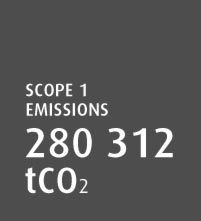


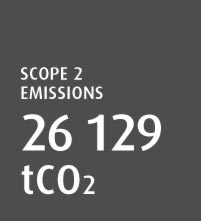

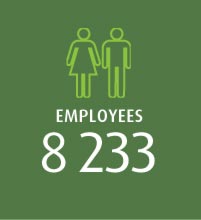

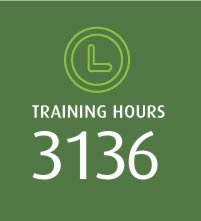
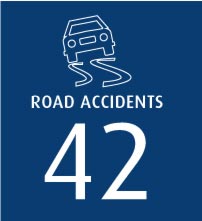



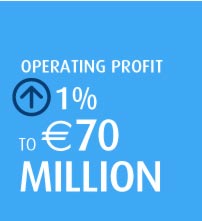
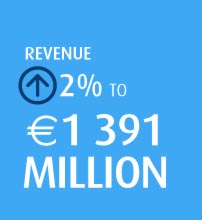
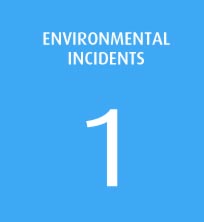

FUEL AND EMISSIONS EFFICIENCY

Recognising that clients are increasingly incorporating sustainability considerations into their decision making, the division is putting in place the systems
required to capture non-financial data across its operations. Fuel efficiency is already a major consideration within the business, and initiatives are
continually underway to use this resource more efficiently, both from a cost and impact perspective.
We continually investigate and implement emissions reduction initiatives, including for example the modernisation of our logistics fleet with Euro 6 trucks
to reduce diesel consumption and training for drivers on fuel-efficient driving.
ENVIRONMENTAL
COMPLIANCE

In line with the EU and national legislation, Logistics International is in the process of establishing an energy management system aligned with the
ISO 50001 standard. Currently energy data such as electricity and heating consumption is monitored through our sustainability data management system.
With the help of the standardised energy management system, we will be able not only to put targets in place but to improve our energy performance by
reducing energy consumption and therefore energy costs and greenhouse gas emissions.
We strive to monitor and improve the efficient use of water, particularly in the areas of our business concerned with chemical manufacturing, the
transportation of liquids and shipping. Several sites, particularly chemical manufacturing operations, have wastewater treatment systems for the re-use of
cleaned waste water for industrial use.
SAFETY AND
WELLNESS

Occupational health and safety standards are strictly regulated by law and the underlying legislation is highly developed. Our corporate policy stipulates
our primary health and safety goals, which are:
>
Reducing accidents at work and work-related illness
>
Reducing work-related hazards
>
Ensuring legal requirements in occupational safety are met and that the organisation is not exposed to legislative risk
>
Systematically improving internal processes for occupational health and safety
The division has implemented various standards to support its goal of meeting the highest quality, environment, health and safety standards, including:
>
Guidelines on occupational safety and health management (NLF/ILO-OSH 2001)
>
Specifications for occupational health and safety management (OHSAS 18000)
>
Standards related to quality management systems (ISO 9001)
>
Guidelines on safety and security for customs procedures (Authorized Economic Operator AEO guidelines)
>
Quality management for service providers to the automotive industry (VDA 6.2)
PEOPLE, PERFORMANCE AND
SUCCESSION

Attracting skilled employees into the logistics industry is challenging in Germany, where the unemployment rate is low (4.7% in June 2015).
To source trainees and develop awareness of employment opportunities in the sector, the division participates in various regional vocational training and
job fairs. It works through a specialist consultancy to make information on opportunities in the company available in tertiary institutions, working with
approximately 300 colleges in the country to recruit graduates, young professionals and engineers. An internet platform for online recruiting has been
developed and the division regularly participates in career and recruitment fairs for students and graduates. Division-wide apprenticeship programmes also
play a major role in attracting graduates and school leavers.
The division offers a wide range of training initiatives each year for different employee categories. In 2014, it started a development programme for young
professionals to support employees and help them achieve and maintain the required competency level. We designed a leadership guideline that outlines
the desired competencies and qualities of our leaders. This guideline is used as a basis for designing our training and development programmes.
We have also started to use diagnostics for the selection of employees and to measure the outcomes of our development initiatives, backed by newly-
implemented talent management software to track talent management, education and performance and competency development in the division.
In 2016, we will focus on career planning initiatives and working with employees to define their career and personal development goals.
VEHICLE IMPORT DISTRIBUTION AND DEALERSHIPS
The vehicle import, distribution and dealerships division is an exclusive importer of 16 automotive and industrial vehicle brands (including Hyundai, Kia, Renault and Mitsubishi). The majority of its imported brands are sold through its extensive network of owned and franchised dealerships in South Africa, which also provide aftersales parts and servicing and distribute the group's financial services products. Outside South Africa, the division is active in selected African markets and Australia.
MATERIAL SUSTAINABILITY ISSUES
EMPLOYEE SUCCESSION AND TURNOVER
High turnover is a feature of the vehicle sales environment, particularly for emerging brands
Read more

EMPLOYEE TRAINING AND DEVELOPMENT
As the division operates in a service industry, training and development of employees is critical
Read more

DIVERSITY AND EMPLOYMENT EQUITY
In addition to regulations governing diversity and employment equity, it is essential that our sales force represents the demographic of our clients
Read more

PRODUCT RESPONSIBILITY AND COMPLIANCE
Formal policies and procedures are in place to assess new products and services before launch and compliance reviews of current product and service offerings are also undertaken on a regular basis
Read more







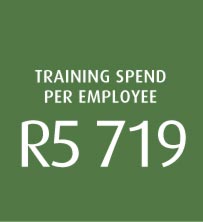
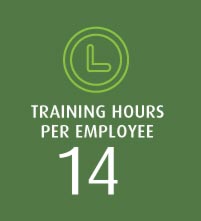
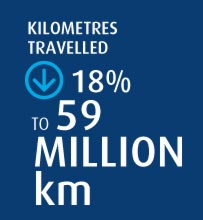
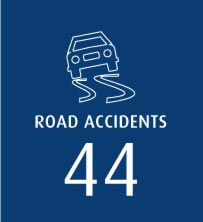

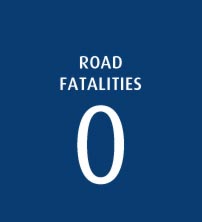

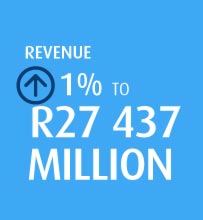
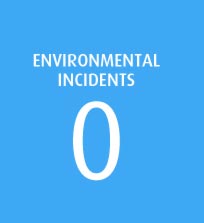

PEOPLE SUCCESSION AND TURNOVER

High turnover is a feature of the vehicle sales environment, particularly for emerging brands. In response, the division has established a Retail Training Academy, alongside the Technical Training Academy already in place. The Academy is aligned with the recently-formed Institute of Vehicle Sales Professionals. High-quality employees will be recruited, trained and developed through the Academy and appropriately remunerated, with the aim of retaining employees through a focused career path as vehicle retail professionals.
EMPLOYEE TRAINING AND DEVELOPMENT

The business requires a knowledgeable and skilled workforce. Training and educational needs and requirements are assessed on an ongoing basis to identify weaknesses and gaps. Appropriate and innovative interventions, solutions and programmes are implemented to address these. Technical training in the vehicles divisions is undertaken through the Imperial Technical Training Academies, which is recognised as a leader in the provision of automotive technical trades training. 226 apprentices from the division were registered in 2015. Training costs across the division were just less than R42 million, over R5 500 per employee.
DIVERSITY AND EMPLOYMENT EQUITY

A senior transformation manager has been appointed in the division and a range of initiatives and interventions are being implemented, including ongoing diversity training. Employment equity plans have been developed and are being implemented. Training and development is undertaken in support of the division's diversity strategy. Of the 226 apprentices in diesel and petrol mechanic trades in 2015, 139, or 61% were black.
PRODUCT RESPONSIBILITY AND COMPLIANCE

Compliance is a material issue for the division as the financial services segment markets and sells a variety of regulated and unregulated products and services and is a registered financial services provider under South African legislation. Formal policies and procedures are in place to assess new products and services before launch , and compliance reviews of current product and service offerings are also undertaken on a regular basis. The results of these processes are presented to the finance and risk committee. Quarterly compliance reports are generated and submitted to the Financial Services Board. To date, no compliance concerns have been raised by the Financial Services Board.
VEHICLE RETAIL, RENTAL AND AFTERMARKET PARTS
The Vehicle Retail, Rental and Aftermarket Parts division's network of
franchised vehicle dealerships is the largest in South Africa, representing
almost all major brands. Dealerships are also distribution channels for
financial services, insurance, vehicle servicing and parts.
In the commercial sector, the division owns and operates standalone
dealerships in South Africa and the United Kingdom (UK). It also operates
two car rental brands in South Africa, as well as the largest pre-owned
vehicle dealer network (Auto Pedigree). The division's panel shops repair vehicles for the
rental fleet, the consumer market and insurance companies, and the
aftermarket parts business wholesales and distributes vehicle parts and
accessories. Its leisure businesses manufacture and sell caravans,
canopies and other leisure accessories.
MATERIAL SUSTAINABILITY ISSUES
PEOPLE, PERFORMANCE AND SUCCESSION
Training and development of employees is a critical enabler to providing superior customer service
Read more

PRODUCT RESPONSIBILITY
When servicing and repairing vehicles we need to meet the stringent quality and safety requirements of clients and OEMs
Read more

REGULATORY COMPLIANCE
Business operations are affected by a range of legislation and regulations
Read more

MINIMISING OUR ENVIRONMENTAL FOOTPRINT
The division has over 500 sites. Saving electricity and water and managing waste disposal are key considerations
Read more


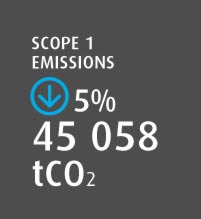



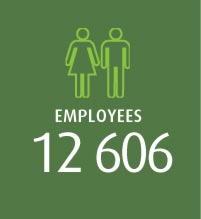
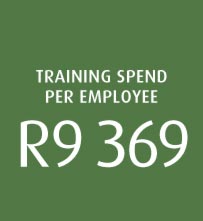

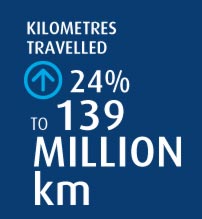


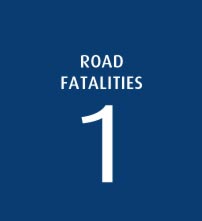

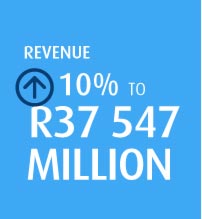
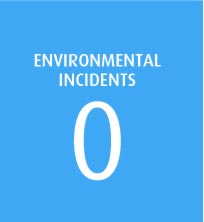

PEOPLE
PERFOMANCE
AND
SUCCESSION

Training and development of employees is a critical enabler in achieving our business objectives,
and in particular in providing superior customer service, as benchmarked against competitors.
Skilled employees are essential to service, diagnose and fix problems on motor vehicles and to
maintain sales volumes and market share in the current challenging economic environment.
We employ new apprentices annually and sponsor training through our own training centre and those
of OEMs, ensuring a pipeline of suitably-qualified technicians. Learnerships are used at various
levels in the division to support transformation plans and build a pool of skilled employees at
junior levels, where high turnover levels are frequently experienced. Management development
programmes are offered in the car rental business to build business and management skills.
Selection for development initiatives is supported by rigorous procedures for the assessment
of candidates, with assessment outcomes being used to build individuals' development plans.
PRODUCT
RESPONSIBILITY

When servicing and repairing vehicles we assume responsibility for ensuring that the stringent quality
and safety requirements of clients and OEMs are met. In our manufacturing plants, we also need to ensure
that products conform to our manufacturing standards and quality control checks before they can be released.
If products are defective, we not only run the risk of costly legal claims and reputational damage, we may
also put our clients at risk.
We ensure that product and service quality is maintained in our operations through technical training and
ongoing reviews of our operations by OEMs. Quality control checks are undertaken before products are released
from our operations into retail outlets.
Our products are required to conform to both regulatory and OEM industry standards. Quality control is undertaken
to make sure that these standards are met. Purchasing of stock items from reputable suppliers is essential.
Technical teams are in place to assess the quality of any parts returned.
No instances of non-compliance with laws and regulations concerning the provision and use of products and
services have been recorded. There have been only minimal recalls on products manufactured by us, and in all
instances technical faults were easily corrected.
REGULATORY
COMPLIANCE

Business operations are affected by a range of legislation and regulations, including the Financial Advisory and
Intermediate Services (FAIS) Act, the Protection of Personal Information Act (POPI), the Consumer Protect Act (CPA),
and the Financial Intelligence Centre Act (FICA). In some cases it will involve reporting to, and audits by,
Regulatory Authorities.
Auditing of critical processes are undertaken by the businesses to ensure compliance. Our internal audit team
plays a key role in assessing the processes and controls in our businesses. Where required, compliance assessments
are undertaken externally.
Compliance is a key element in the business and management are well aware of all the different legislation affecting
our business. There were no instances of non-compliance with legislation in 2015.
MINIMISING
OUR ENVIRONMENTAL FOOTPRINT

The division has over 500 sites, which collectively consumed over 60 000 Mwh of electricity during 2015.
Investments were made during the year at many of these operational sites to reduce the consumption of
electricity through the installation of energy saving light bulbs, the use of solar panels and light sensors.
Timelines have been put in place for the roll out of sustainability initiatives in the division.
The division is a relatively heavy user of water, for manufacturing operations and for washing cars prior to
retail or hire. Over 550 000 kL of water were consumed by the division in 2015. Many dealerships have implemented
water conservation initiatives, such as the use of Eco Wash, a highly water-efficient means of washing cars, or
the recycling and retreatment of water in specially-designed wash bays.
FINANCIAL SERVICES
The financial services division provides motor-related financial services
and products through LiquidCapital (maintenance, warranty products and
other financial products associated with the automotive market) and vehicle
leasing through Imperial Fleet Management and Ariva.
In line with the group's strategy to dispose of non-core and strategically
misaligned assets, negotiations for the sale of Regent are currently
underway and progressing positively. Motor-related financial services and
products remain an integral part of the Group's strategic focus on the full
automotive value chain.
The division has a small environmental footprint, but continues to
monitor the potential impact of climate change on its business,
particularly in relation to vehicle insurance sector which has been
affected by adverse weather conditions.
Further reductions in the environmental footprint of the business are
targeted, both through technology and improvements to the group's
facilities and through employee engagement.
MATERIAL SUSTAINABILITY ISSUES
DIVERSITY AND EMPLOYMENT EQUITY
Employees should both reflect the demographics of our clients and differentiate our offering through the delivery of sound financial advice, product and excellent service
Read more

PRODUCT RESPONSIBILITY AND COMPLIANCE
Product responsibility and compliance is material to the financial services sector, particularly with new regulation such as Treat Customers Fairly (TCF)
Read more

CUSTOMER PRIVACY
Our systems are aligned with proposed legislation in South Africa regarding customer privacy
Read more

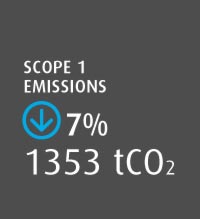



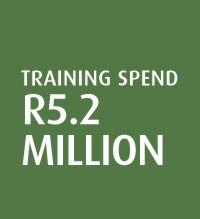

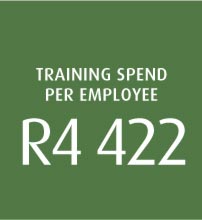
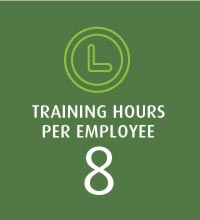

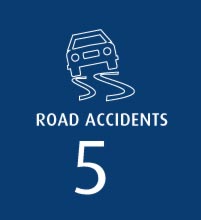

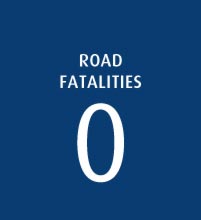

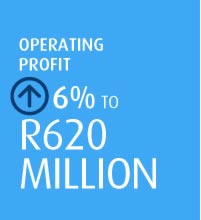
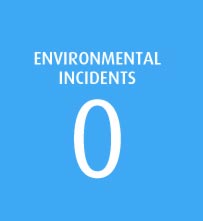

DIVERSITY AND
EMPLOYMENT
EQUITY

Our aim is that our employees should both reflect the demographics of our clients and differentiate our
offering through the delivery of sound financial advice, product and excellent service. We know that
transformation is good for our business success in the long term. Our support for BBBEE objectives
contributes to the diversity of our organisation, broadens our range of skills and perspectives,
gives us a better understanding of a broader range of market segments and affords us access to new
business networks and opportunities.
Over the past year we have put in place a three-year employment equity plan to meet employment
equity targets.
PRODUCT RESPONSIBILITY AND COMPLIANCE

Regent has put the Treat Customers Fairly (TCF) initiative at the core of our business and customer centricity is paramount. TCF legislation came into effect at the beginning of 2014. Our positioning of TCF as a critical business imperative will enhance our strategy of empowering our clients. Companies will be required to demonstrate through management behaviour, measures and monitoring that they are consistently treating customers fairly in all phases of their relationship with clients, including product design and marketing, the provision of advice on services and during point-of-sale and after-sale contact. Successful delivery of these outcomes will ensure that customers' financial services needs are appropriately met by a sustainable industry.
CUSTOMER
PRIVACY

With the expected implementation of the Protection of Personal Information Act (POPI) in South Africa, we have developed a policy regarding customer information and the safeguarding and storage of customer data. This will be rolled out as part of the division's strategy for upgrading its IT infrastructure.
PRODUCT RESPONSIBILITY

Compliance is a material issue for the division as the financial services segment markets and sells a variety of regulated and unregulated products and services and is a registered financial services provider under South African legislation. Formal policies and procedures are in place to assess new products and services before launch , and compliance reviews of current product and service offerings are also undertaken on a regular basis. The results of these processes are presented to the finance and risk committee. Quarterly compliance reports are generated and submitted to the Financial Services Board. To date, no compliance concerns have been raised by the Financial Services Board.

IMPERIAL'S
COMMITMENT
- to society
As Chairperson of the social, ethics and sustainability committee of the Imperial Holdings board, it is my responsibility to monitor the impact of our business operations on society and on the environment and to ensure that we conduct our business in a way that retains the support of our stakeholders.
- Valli Moosa -
WHAT DOES THIS MEAN FOR IMPERIAL?
Firstly, it implies that we need to engage with stakeholders with the objective of understanding what
creates value in their eyes. Throughout this report we describe these stakeholder interactions and
the solutions and services that we have developed as a result.
One example is the engagement which takes place with clients of our logistics divisions to harness
logistics efficiencies. Our highly-skilled employees deploy the latest processes and technology to
optimise transport routes with clients, thereby increasing access to goods at a lower financial and
environmental cost.
A focus on the reduction of emissions has led
us to an important finding - that our carbon
footprint can be reduced and that this can be
achieved profitably in many cases.
This concept is gaining
internal momentum and is supported by increasingly robust systems for gathering and analysing
data on environmental performance.
Overlaying such specific stakeholder interactions is a more general expectation of society from
business that we focus consciously on operating our business responsibly and sustainably. This
means that we need to have the right values in place and act on them consistently, every day, that
we implement controls to manage environmental, safety and health risks, that products are
responsibly sourced, employees are trained and developed and that opportunities to support
small business and job creation are pursued.
As the largest logistics business operating in South Africa, where road transport is extremely
hazardous, we also carry a specific responsibility to do what we can to reduce the number of road
accidents. This has meant hardwiring safety features into our vehicles, including speed control,
tracking and breathalyser tests. We undertake regular mandatory maintenance of vehicles and have
installed cameras both inside and outside vehicles for use in analysing accident data. We ensure that
our drivers hold valid professional driving permits and undergo regular health examinations and
accident prevention training.
We take our responsibilities as the employer of over 57 000 people seriously. We want our
communication with employees to be two-way. We rely on employees to deliver superior services to
clients and in return, we want them to benefit from the group's success and profitability. The
Ukhamba share scheme has allowed employees to share in the commercial success of the group.
Through recruitment, talent management and employee development, we strive to build an
employee profile that is truly representative of society. Not because we see transformation and
employment equity as a matter of compliance, but because we want to build a business that is
better able to serve society and meet its needs, sustainably.
Over the last year, I have been delighted by the commitment to sustainable development.
Our sustainability agenda integrates our activities and shapes our thinking in a way that allows us to go
further and make the most of our efforts to do the right thing.
This report reflects on our achievements, but is also honest about the challenges and risks we face
and how we are addressing them. We see it as an important aspect of our interaction with society
and encourage our stakeholders to read and respond to the information presented.
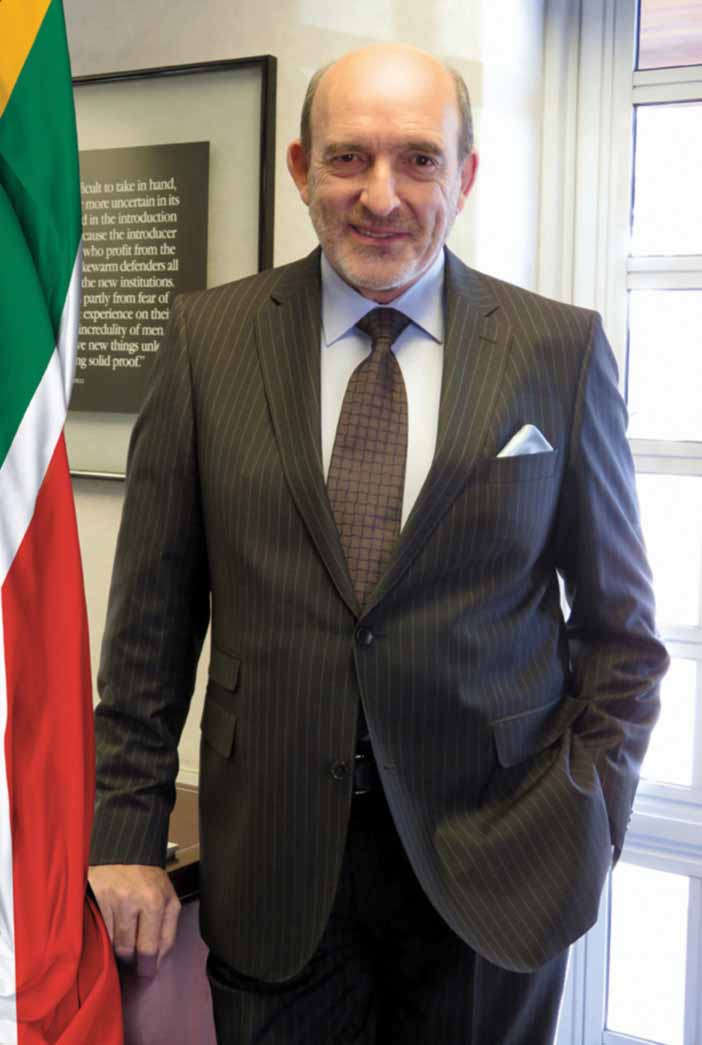
INTEGRATED
THINKING
- at Imperial
We are mindful that the effects of our commercial activities on broader society are potentially significant and as fiduciaries we strive at all times to exercise due care in our dealings with stakeholders.
- Mark Lamberti -
- Watch Mark Lamberti's Video Address -
As an employer, supplier, client, taxpayer and investment, Imperial ranks among South
Africa's larger companies, with a direct or indirect impact on tens of thousands of lives in our
operations around the world. We are mindful that the effects of our commercial activities on
broader society are potentially significant and as fiduciaries we strive at all times to exercise
due care in our dealings with stakeholders. We do so in an era when the legitimacy of
business is at an all-time low and the creation of shareholder value is a necessary but
insufficient condition for sustainability. We therefore subscribe to the view that corporate
sustainability is founded on accountability for decisions that impact people, planet and profits
in the long term.
We know that the foundation of our performance and progress is the provision of
competitively priced products and services of high quality, conducted within all laws and
regulations, and to high ethical standards. But there are additional responsibilities attached to
a corporation of Imperial's size and reach. Among the most important of these is the
demonstration of our societal relevance, not through redistribution as a charitable donor, but
in the businesses we operate.
Management is committed to deepening its understanding of the concept of shared value
creation - creating concurrent economic and societal value by identifying viable new business
activities that address societal needs - and adopting it in the way Imperial does business. A
formal economic impact and stakeholder study is underway to form a clearer picture of how
Imperial affects our direct and indirect stakeholders. We anticipate that this analysis will not
only inform the social and environmental initiatives we undertake in future and support
improved reporting and communication to all stakeholders, but will also over time help to
embed long-term integrated thinking and decision-making that serves shared value creation
within the group.
In the interim, we have continued our efforts to minimise our environmental footprint and
enhance the societal benefit created both through our philanthropic activities and,
increasingly, through our core business. During 2015, we made progress particularly on fuel
efficiencies within our logistics divisions and on continuing the installation of water
conservation and waste management measures at vehicle dealerships. In particular, I would
like to highlight progress within the Africa Logistics division, where despite revenue growth of
15% and an increase in the number of transport kilometres travelled of 2%, the division was
able to achieve a decrease of 3% in fuel usage and a reduction of Scope 1 emissions of 6%.
These reductions not only reduce our environmental footprint, but also result in cost
reductions for clients that have an impact on the cost of transport of goods to end
consumers.
It has been my rare privilege to have visited the Antarctic continent on two occasions, once
with a team of climate change scientists. In that environment, and with the insights of leading
edge science, it is clear that our current experience of global warming is more than just a
feature of another long term global weather cycle. Amid strident debate around the causes of
global warming, we must acknowledge that carbon emissions are at very least a contributory
factor. With this knowledge, and for the sake of our children, we must assume responsibility
for the reduction of our personal and corporate carbon footprints and we must gain a better
understanding of the profound changes that are taking place in our environment and their
causes, as well as the actions that we, as business, need to take in response.
In our main market of South Africa, fuel quality does not unfortunately permit us to use
vehicles that are Euro 4 compliant, which would help us improve our footprint further. The
majority of our vehicles are however Euro 3 compliant. In addition, there is not yet the
infrastructure in place to support a strong market for electric and hybrid vehicles. We
anticipate however that these conditions will change in time - I have personally made the
transition to an electric vehicle and have found the driving experience rewarding.
In our detailed study of stakeholder requirements, we are laying the foundation for a future
business that is able to take a leadership role in our chosen sectors, recognising the need for a
broader approach to leadership and value creation and putting in place the processes and
partnerships that are necessary to achieve this.
STAFFING FOR
PERFORMANCE AND SUCCESSION
Imperial relies on the sale of goods and services. Our employees are critical to building, maintaining and deepening the client relationships on which we depend. It is Imperial's employees who make us Leaders in Mobility
OUR GEOGRAPHIC REACH
IMPERIAL EMPLOYS AROUND
51 000 PEOPLE
IN 31 COUNTRIES
ON five CONTINENTS
We rely on our employees to differentiate
our business and outperform our peers.
In this section, we report on the actions
that we are taking to develop our
employees and manage our talent pool.

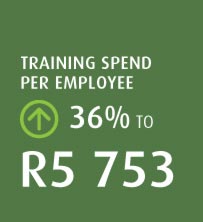
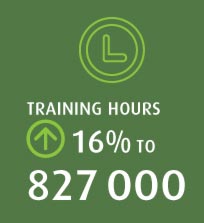

MANAGING OUR TALENT POOL
Recognising the need to be more pro-active in
building a pipeline of the talent for group, we
developed and began implementation of a
group-wide talent management framework
during the 2015 financial year.
Read more

MANAGING
OUR TALENT
POOL

Imperial has evolved entrepreneurially, with each division recruiting, tracking and developing its own top talent. Recruitment for senior roles has typically taken place from within each division, and turnover rates are low. Senior leaders benefit from deep specialisation in their area of business.
To support our growth objectives, however, we recognised the need to develop executive capability as a group resource, identifying, selecting, developing and rewarding exceptional leaders who can serve across the business. We also wanted to be able to widen our pool of potential candidates to those in other industries and from outside the business, as our business growth requires it. Our proposed talent management framework supports these objectives by providing a consistent basis for calibrating both internal and external candidates for senior roles.
Underpinning this initiative is our strategic view of the business, including an understanding of the sectors in which we are competing and the factors which give us competitive advantage today and will continue to contribute to value creation in an environment of profound systemic and structural change. We understand that the balance between factors which can and cannot be controlled has changed significantly and that, in this context, our executives need to be well equipped to make conscious business strategy choices about how to allocate capital within their businesses and divisions.

OUR APPROACH TO TALENT MANAGEMENT
We have identified a clear series of steps to improve talent management processes in our business:
1
Implementation of a talent management strategy
Our talent management framework will allow consistent practices to be followed across the group but will be flexible enought to meet each divisions needs. The strategy will provide guidelines to identify the talent that meets the group's requirements and minimise subjectivity in decision making.
2
Establishment of an Executive Forum
This group of approximately 150 top leaders will embark on a journey to develop their leadership capacity through targeted interventions, designed to effect a shift in business culture and to develop a better awareness of the qualities required from leaders in the business.
To support these processes, we are establishing a more comprehensive group-wide human resource architecture
Read more

Local employment and talent management in our international operations
As the group expands internationally, we aim to develop local employees and recruit local talent in our countries of operation. Expatriates may be required in certain financial and technical roles or to provide management and oversight in new acquisitions, but do not always bring with them first-hand knowledge of local markets and culture. As our overseas growth is primarily by acquisition, retaining key individuals in the businesses we acquire is also an important consideration.
27% of
employees
are in locations
outside South
Africa
99.5% of
employees
are South African citizens.
98% of senior management
are South African.
OUR APPROACH TO TALENT MANAGEMENT

To support our talent management framework, we are establishing a more comprehensive group-wide human resource architecture that will provide the data we require to identify the capability requirements for each role, potential growth opportunities for employees early in their careers and potential future successors for senior leaders who are not yet on our radar. In short, the human resource architecture will provide objective and consistent data on our most important resource our people to enable better decisions to be taken about how they can be developed and deployed.
As a result of these steps we anticipate delivering:
>
Improved operational and technical capabilities,
including accurate workforce planning;
>
People-focused leadership, which we believe is key to
improved organisational performance and
sustainability; and
>
A shift from a culture which is by nature focused on
driving superior operational and financial performance,
particularly over short-term time horizons, to developing
increased capability for strategic thinking that sustains
long-term value creation
We expect to roll out our talent management system over the next 18 months, an ambitious timeframe for such a comprehensive initiative in a business of the scale and diversity of Imperial. Implementation of the framework will be accompanied by a communications strategy to ensure that the model of change is well understood by employees and ongoing work to raise the profile and skills of the human resources function in the business.
As we formalise talent management structures in the business, we will seek to retain the empowering culture that has benefited Imperial in the past, and is derived from the entrepreneurial origins of the group.
PEOPLE DEVELOPMENT
In addition to the talent
management initiatives described,
we continue to maintain a strong
focus on training and developing
employees at all levels. We believe
that people development is critical
for the group's growth and
performance.
Read more

827 093
hours of
employee training
were undertaken during 2015
at a cost of
R295 million,
training spend of
R5 753 per employee
(2014: R217 million)


PROMOTING
WORKFORCE DIVERSITY
As 37 000 of our employees (64% of our workforce),
are located in South Africa, a key imperative
for the group is to ensure that historically
disadvantaged South Africans are represented
at all levels of the business in South Africa
and that these employees are adequately
supported in their development.
Through the Ukhamba Holdings share scheme
structure, we have created a vehicle that
can enable employees to participate in
share ownership.
Click here for details of the scheme
structure and impact
Improvement in BBBEE performance at a group or divisional level, as appropriate, determines 20% of the incentives paid to all South African- based group executives.
Our board is
22%
black
11%
female
Our senior
leadership is
7%
black
20%
female
34%
of junior
management
in South Africa is black.
These employees are
a key part of our
talent pipeline.
Click here for our detailed employment equity
figures.
UKHAMBA
HOLDINGS
SHARE SCHEME
STRUCTURE

Ukhamba is an investment holding company which was formed by Imperial on 6 November 1998
as a joint venture between Imperial and the Ukhamba Trust. The Ukhamba Trust gave historically-
disadvantaged South Africans an opportunity to purchase an interest in Ukhamba through the
purchase of Ukhamba Trust A units.
The company was formed to create a culture of savings among Imperial's historically disadvantaged
employees and to give employees an opportunity to generate wealth. Seed capital of R15 million
was provided by Imperial for the creation of Ukhamba.
In 2004, Imperial issued an effective 10,1% of its share capital to Ukhamba Holdings. Since then,
Ukhamba has distributed R850 million to shareholders. Ukhamba was restructured in 2013 to allow
beneficiaries to monetise their investment in Imperial. This was done through an over-the-counter
listing of A shares.
Ukhamba also owns shares in a JSE-listed company DAWN Limited and in unlisted companies, Probe
Corporation SA, Life Green Group Investment Holdings and Giuricich Brothers Construction.

|
|
Male |
Female |
Foreign Nationals |
|||||||||
|
Occupational |
African |
Coloured |
Indian |
White |
African |
Coloured |
Indian |
White |
Male |
Female |
Total (2015) |
Total (2014) |
|
Permanent |
||||||||||||
|
Top management |
1 |
1 |
6 |
90 |
6 |
3 |
4 |
7 |
|
2 |
120 |
159 |
|
Senior |
27 |
10 |
41 |
340 |
13 |
5 |
16 |
77 |
|
|
529 |
588 |
|
Professional |
280 |
190 |
309 |
1 367 |
144 |
95 |
141 |
789 |
6 |
9 |
3330 |
3242 |
|
Skilled junior |
2 382 |
967 |
792 |
2 467 |
848 |
402 |
303 |
1 409 |
47 |
10 |
9627 |
10541 |
|
Semi-skilled |
9 360 |
1 738 |
623 |
921 |
2 344 |
818 |
404 |
1 205 |
70 |
18 |
17501 |
15200 |
|
Unskilled |
4 040 |
576 |
93 |
59 |
1 091 |
152 |
4 |
17 |
35 |
2 |
6069 |
6421 |
|
Total permanent |
16 090 |
3 482 |
1 864 |
5 244 |
4 446 |
1 475 |
872 |
3 504 |
158 |
41 |
37176 |
36151 |
|
Non-permanent |
220 |
25 |
18 |
40 |
113 |
21 |
14 |
27 |
|
|
478 |
2615 |
|
Total |
16 310 |
3 507 |
1 882 |
5 284 |
4 559 |
1 496 |
886 |
3 531 |
158 |
41 |
37654 |
38766 |
|
Geographic breakdown of workforce |
2015 |
2014 |
|
|
South Africa |
37654 |
38766 |
|
|
Rest of the world |
13707 |
12905 |
|
ENHANCING SOCIETAL IMPACT AND LEGITIMACY
AMONG ALL STAKEHOLDERS
At all levels in our business, we seek constantly to understand stakeholder concerns, minimising any negative impacts of our business on society and on the environment, and enhancing the value we create for all stakeholders now and into the future.
KEY STAKEHOLDER INTERACTIONS
In setting and implementing group
strategy, we are conscious that the
decisions we take may impact on a
broad range of stakeholders and
that we, in turn, need to secure
the support of stakeholders to
deliver against our strategic goals.
In 2015, we commissioned a detailed
stakeholder study, to obtain deeper
insights into the requirements of
our stakeholder groups and their
perceptions of our business.
Read more

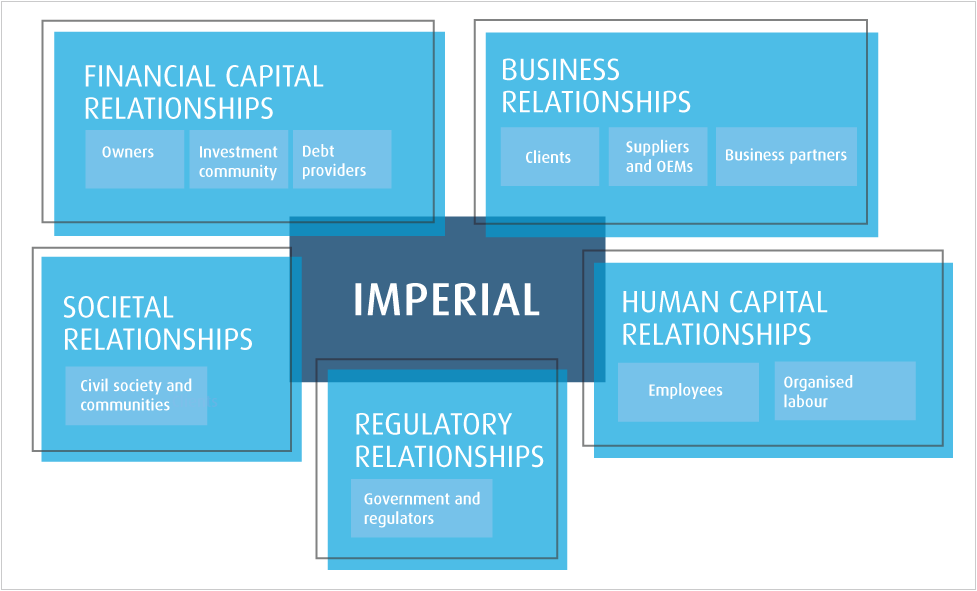
RELATED DOWNLOADS
HOW WE DEFINE
STAKEHOLDERS

Our stakeholders are those entities or individuals that may be significantly affected by the activities,
products or services of the Imperial group, as well as those whose actions may affect the ability of
the group to successfully implement its strategies and achieve its objectives.
Our stakeholders include a wide range of groups and individuals, with varying levels of involvement
with the business, and diverse and sometimes conflicting interests that we need to balance.
OWNERS

Share owners expect favourable long-term returns on their investments in our group, and have the inalienable right to exercise effective ownership over their equity. Any dilution of this right by management for any reason whatsoever will irretrievably undermine our corporate integrity, and cannot be tolerated.
DEBT
PROVIDERS

We work with debt providers to access debt funding at competitive rates in different jurisdictions, facilitated by our balance sheet and credit rating.
INVESTMENT
COMMUNITY

Research analysts facilitate an understanding of the group for our owners and prospective investors, who provide the capital we need to execute on our strategy. Collectively, the investment community supports the effective functioning of equity markets, which is essential to attracting capital at a fair price.
CLIENTS

Our clients’ needs drive the nature of the products and services we offer and the way in which we deliver them. Strong competition in our areas of mobility and changes to our clients’ operating contexts require that we strengthen our customer focus and unlock value for our clients.
SUPPLIERS
AND OEMs

Our suppliers are critical to our client relationships given their role in the quality and delivery of products and services, and their adherence to our ethical standards. A number of OEMs we represent have specific criteria that cover various aspects of how we retail their product.
BUSINESS
AND JOINT
VENTURE
PARTNERS

Strategic partnerships, including finance partners and joint ventures, enable deeper penetration into value chains and greater reach of our products and services. BEE partners are critical to meeting our moral obligations and delivering on elements of our BEE scorecard.
GOVERNMENT
AND REGULATORS

The Imperial Group is subject to various regulations across multiple jurisdictions.
CIVIL SOCIETY
AND
COMMUNITIES

Our social licence to operate depends on being a good corporate citizen and maintaining constructive relationships with the communities in which we operate.
ORGANISED
LABOUR

Many of our employees choose union representation in exercising their rights. While we respect their choice to do so, it can never diminish our obligation to interact directly with them as individuals in a fair, open and respectful manner.
EMPLOYEES

Every employee contributes skills, perspective and energy to building, maintaining and deepening the relationships with our clients and other stakeholders on which our survival depends. Together, within the framework set by Imperial, our employees determine the quality of the working environment and the group’s ability to attract and retain individuals of calibre at all levels. Investment in the development of their capabilities and skills is an imperative.
COMMUNITY DEVELOPMENT
Imperial undertakes numerous community development initiatives, designed to deepen our relationship with society and address pressing social and community needs.
We regularly assess community-based initiatives to evaluate how we can make a positive impact on communities, contribute to job creation initiatives and engage on shared interests and concerns.
During the 2015 financial year, the Imperial group invested a total of R11,5 million in the Imperial and Ukhamba Community Development Trust and R12,2 million in various other community investment programmes, primarily projects driven through the business divisions
Read more



IMPROVING OUR
ENVIRONMENTAL
PERFORMANCE
During the year, many initiatives were undertaken to improve the fuel efficiency and environmental performance of Imperial's operations, lowering emissions and obtaining cost benefits, both for the group and for clients.
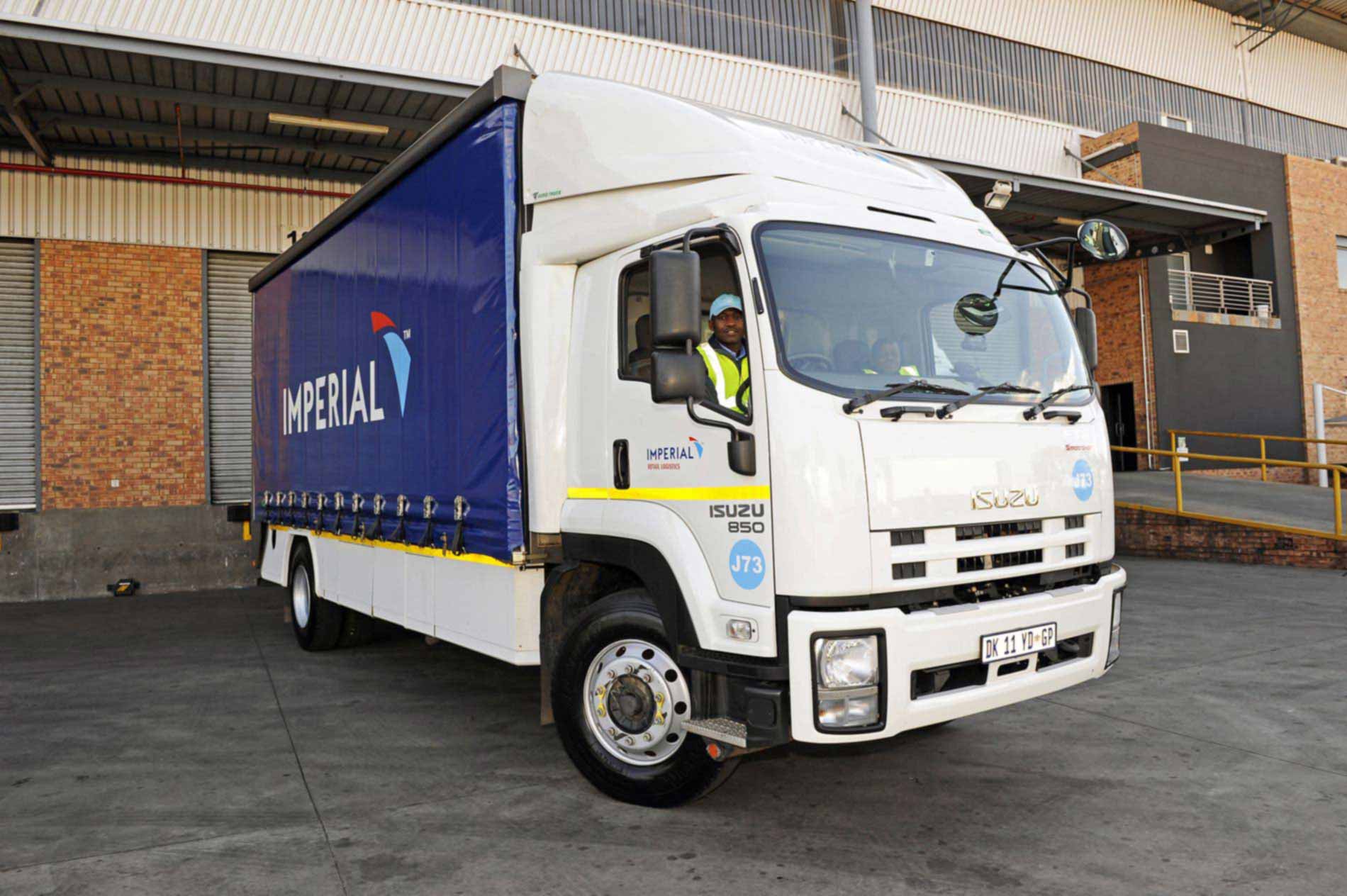
82% OF IMPERIAL'S
SCOPE 1 AND 2 EMISSIONS
ORIGINATE FROM FUEL USAGE.
OUR LOGISTICS DIVISIONS ARE
THE HEAVIEST USERS OF FUEL
IN THE GROUP
LOGISTICS AFRICA AND LOGISTICS
INTERNATIONAL ACCOUNT FOR
78% AND 10%
OF THE GROUP'S
FUEL CONSUMPTION
AND 60% AND 31% OF SCOPE 1
EMISSIONS RESPECTIVELY
HARNESSING EFFICIENCIES TO REDUCE ENERGY CONSUMPTION AND EMISSIONS
The harnessing of logistics efficiencies
is currently our biggest opportunity
to reduce energy consumption -
in the form of fuel - and therefore
emissions.
Transport and distribution are
becoming increasingly complex and costly.
Regulatory factors, cost pressure, increased
service levels and flexibility are all factors that
challenge the traditional approach to transport.
In this context, we achieve emissions and cost
savings for clients in a number of different ways
- through technology, by improving driving or
navigation techniques and, increasingly, through
smarter logistics solutions which simply mean
that goods travel shorter distances to reach
consumers and clients, at a lower cost.
DOWNLOAD

|
2015 |
|||||||
|
Vehicles |
Logistics |
Financial |
Group |
||||
|
Import, |
Car retail, |
Logistics |
Logistics |
|
|
||
|
Fuel usage (kL) (Road) |
13 029 |
17 383 |
200 514 |
25 207 |
595 |
256 728 |
|
|
Fuel usage (kL) (Non-Road) |
0 |
68 |
1 252 |
69 917 |
0 |
71 237 |
|
|
Scope 1 emissions (tCO2) |
33 554 |
45 058 |
546 415 |
280 312 |
1 353 |
906 692 |
|
|
Scope 2 emissions (tCO2) |
32 776 |
60 393 |
77 611 |
26 129 |
2 328 |
199 237 |
|
|
Total scope 1 and 2 emissions (tCO2) |
66 330 |
105 451 |
624 026 |
306 441 |
3 681 |
1 105 929 |
|
|
2014 |
|||||||
|
Vehicles |
Logistics |
Financial |
Group |
||||
|
Import, |
Car retail, |
Logistics |
Logistics |
|
|
||
|
Fuel usage (kL) (Road) |
14 044 |
17 982 |
207 677 |
18 658 |
638 |
259 026 |
|
|
Fuel usage (kL) (Non-Road) |
|
|
|
|
|
|
|
|
Scope 1 emissions (tCO2) |
36 673 |
47 443 |
578 765 |
204 178 |
1 452 |
868 511 |
|
|
Scope 2 emissions (tCO2) |
35 560 |
65 637 |
81 842 |
30 685 |
2 813 |
216 537 |
|
|
Total scope 1 and 2 emissions (tCO2) |
72 233 |
113 080 |
660 607 |
234 863 |
4 265 |
1 085 048 |
|

The use of Thermo Shields and solar water heating on the Imperial Health Sciences building in Cape Town
MINIMISING THE ENVIRONMENTAL FOOTPRINT OF OUR BUSINESS
Taking into consideration the nature of our
business, the most significant opportunities
for minimising our environmental and
business footprint include:
>
Reducing the consumption of water, particularly
in water-scarce areas such as South Africa
>
Reducing electricity consumption
>
The safe disposal of hazardous and non-hazardous
waste, which is recycled or re-used where possible
During the year, a range of measures were taken
across all divisions in the areas of waste management,
water and electricity conservation and environmental
management.

ROAD
SAFETY
Our focus on road safety extends beyond our own operations, we work in partnership with government, road agencies and civil society organisations to support a positive change in the attitudes of all citizens to safe road usage.
IMPROVING SAFETY OUTCOMES IN OUR BUSINESS
In addition to programmes addressing structural concerns of national interest, divisions continually seek to improve safety outcomes through a number of initiatives targeting employee wellness and road safety.
Centralised data systems, such as the Imperial Sustainability Management System (ISMS), have become an important management platform for these efforts, as they provide the group with the ability to analyse and respond to performance trends.
DOWNLOAD

DURING 2015,
103 INJURIES
WERE RECORDED AMONG
EMPLOYEES AND SIX
FATALITIES OCCURRED
THE NUMBER OF
FATAL ACCIDENTS
IN OUR LOGISTICS
AFRICA DIVISION
DECREASED
FROM SEVEN
TO FIVE
PUTTING THIS DATA INTO
PERSPECTIVE, ALMOST
500 MILLION KILOMETRES
WERE COVERED BY LOGISTICS
AFRICA VEHICLES BY ROAD
DURING THE YEAR
EQUIVALENT TO TRAVELLING
AROUND THE WORLD OVER
11 500 TIMES

SPEND ON THESE
PROGRAMMES IN
2015 WAS AROUND
R3,6 MILLION
IMPERIAL'S NATIONAL ROAD SAFETY INITIATIVES IN SOUTH AFRICA
Imperial invests a significant level of resources in road safety initiatives. These are undertaken in partnership with national and provincial government and target major areas of concern such as child safety, the monitoring of safety standards on trucks and the reduction of crashes on high-risk, high-traffic national highways.
DOWNLOAD
SUSTAINABLE DEVELOPMENT
DOWNLOADS
DOWNLOADS
EXPLORE


SOCIAL
IMPACT
Our core logistics business in Africa has a significant social and developmental impact. During the year, the division strengthened its network, capabilities and customer base in Africa through the acquisition of a 70% shareholding in Imres, a Netherlands-based wholesaler of medical supplies with a diversified client base in the international medical relief industry and a strong presence in Africa.